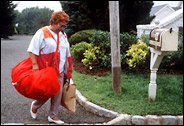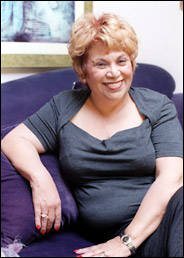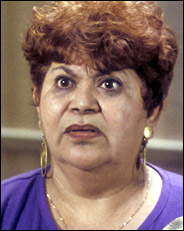|
 |
|
Esta página no está disponible en español. THE NEW YORK TIMESTrying To Get Beyond The Role Of The MaidBy MIREYA NAVARRO
MAY 16, 2002
But for most of her 25 years as an actor, Ms. Ontiveros has played mostly maids. She figures she has played a maid at least 150 times, in films like "As Good as It Gets" and NBC sitcoms like "Veronica's Closet" and, most recently, "Leap of Faith." "It's their continued perspective of who we are," Ms. Ontiveros said of Hollywood and how it views Hispanics. "They don't know we're very much a part of this country and that we make up every part of this country." Indeed, to play a maid, she must put on an accent her family lost a generation ago. "When I go in there and speak perfect English, I don't get the part," said Ms. Ontiveros, a college graduate from El Paso whose parents were immigrants from Mexico and owned two restaurants and a tortilla factory. The role of maid has belonged to different ethnic groups at one time or another in the history of film and television, but these days it seems to be a niche for Hispanic actresses, especially on prime-time television. As maids, they are now featured on, or have made recent appearances on, "Will and Grace" (Rosario) on NBC, "Dharma and Greg" (Celia) on ABC and even in animation, with "King of the Hill" (Lupino) on Fox. There was also "Pasadena," a prime-time soap on Fox that was broadcast four times this season; Ms. Ontiveros played Pilar, one of two Hispanic maids. (There was also one white maid.) Film and television typecasting of blacks in such roles once led to protests by groups like the National Association for the Advancement of Colored People, and today the black maid has all but disappeared from big screen and small. But that sensitivity has not carried over to Hispanics. Ms. Ontiveros has become a sort of Hispanic Hattie McDaniel, who played variations of the smart-mouthed maid in dozens of movies in the 1930's and won an Oscar for best supporting actress for her portrayal of Scarlett O'Hara's mammy in the 1939 film "Gone With the Wind." Children Now, a child-advocacy group in Oakland, Calif., that keeps track of diversity on prime-time television, says that Hispanics are the most significantly underrepresented ethnic group on prime time – given their 12 percent share of the nation's population – and that Latino characters, more than any other, tend to be concentrated in low-status occupations like service workers, unskilled laborers and criminals. The group released a report yesterday taking NBC, ABC, CBS, Fox, UPN and WB to task for making "minimal progress" on diversity on prime-time television. "The baton has been passed from black actors to Hispanic actors to play this kind of stereotypical role," said J. Fred MacDonald, a television and radio historian who runs a historical film archive in Chicago. The reasons for the pigeonholing were not clear, he said, but there did not seem to be enough of a united front among the Hispanic groups to pressure the industry as black groups did. Others said the lack of variety in roles could also have to do with the fact that many writers and producers live in Los Angeles, where many maids, if not most, are indeed Hispanic: maids, gardeners, parking valets and restaurant workers may be the only Hispanics those in charge of the shows may know. "It's not that some Hispanics are not maids," said Jeanine Basinger, chairwoman of the film studies department at Wesleyan University. "The issue is that not all Hispanic women are maids. And since some white women and black women and Asian women are maids, can we see maids other than?" In a study by the Tomas Rivera Policy Institute commissioned by the Screen Actors Guild in 1999, actors from Los Angeles, New York and Miami complained that the entertainment industry seemed stuck on the image of Hispanics as mostly poor, Spanish-speaking or of recent immigrant origin. This week, at the preview of the fall season, NBC, the No. 1 network, introduced the comedy "Good Morning, Miami," featuring Tessie Santiago, a Miami native, as Lucía Rojas Miller, a scatterbrained co-anchor of a morning television show who sports tight red outfits and a heavy Spanish accent. In "Kingpin," a six-part limited series about a drug lord and his family, the main female Hispanic character also has an accent and works as a Drug Enforcement Administration agent. Jeff Zucker, president for NBC entertainment, says it is just a matter of time before Hispanic portrayals evolve into a fuller picture.
Officials at Fox played down the significance of Hispanic maids on "Pasadena" and "King of the Hill," noting that "Pasadena" also had a white maid and that the maid on "King" was a minor character that made only rare appearances. "Can we also take a look at the other roles Latinos are being placed in?" said Mitsy Wilson, senior vice president for diversity development at Fox, speaking of lead roles like those played by Jessica Alba on "Dark Angel." "We're moving in the direction of putting people in roles of leading characters." In the fall season, WB plans to put on "Greetings From Tucson," a comedy about a Mexican-Irish family, and CBS is to add "C.S.I.: Miami," to feature a Hispanic character in the ensemble. But typecasting seems entrenched even as the depiction of Hispanics in movies and television has improved noticeably, with increasingly versatile roles offered to Hispanic actors, thanks to an increase in Latin-themed projects made by Latinos and the mainstream success of Hispanic leads like Jennifer Lopez and Antonio Banderas. Ms. Ontiveros has had some independent film standing of her own, winning a special jury prize for acting at this year's Sundance Film Festival for "Real Women Have Curves," an HBO movie that will have its premiere in September. The film is about generational conflict between a Mexican-American teenager (America Ferrera) who wants to go to college, while her mother, played by Ms. Ontiveros, wants her to work in a Los Angeles sweatshop. Last year, she received excellent notices for her role as the maid Consuelo in Todd Solondz's "Storytelling." And in 2000, Ms. Ontiveros won the National Board of Review award for best supporting actress in the film "Chuck and Buck," in which she played a sympathetic theater manager without an accent. On television, the Latin-themed "George Lopez Show" on ABC, "Resurrection Boulevard" on Showtime and "American Family" on PBS present other images of Hispanics. But Hispanic actors and media watchdogs argue that stereotypical roles loom disproportionately large because there are not enough alternatives to counteract something like the Hispanic maid in hit comedies like "Will and Grace." "As long as Latinos are not a force in the writing and producing, the wait is going to be a lot longer," said Judy Reyes, who plays a no-nonsense nurse on NBC in "Scrubs." In its report, Children Now said Latino characters in the 2001-2 television season inched up to 4 percent of the prime-time population, from 2 percent the previous year. But they remained stuck at only 2 percent of primary recurring roles. "We see a troubling picture," said Patti Miller, director of the group's program on children and the media. "Television may be entertainment, but what message does that send to a Latina girl about her place in the world?" Lisa Navarrete, spokeswoman for the National Council of La Raza, a civil rights organization that puts on the annual American Latino Media Arts Awards to promote the Latino image in entertainment, said the problem of perceptions runs deep. She noted that in the Oscar-winning film "A Beautiful Mind," based on the life of John Forbes Nash, the math genius and Nobel laureate, there was one factual lapse that received little attention but particularly rankled her. His wife, Alicia Nash, is from El Salvador, but the movie made no mention of her ethnicity and the part was played by Jennifer Connelly, a non-Latina, who won an Oscar for the portrayal. Ms. Navarrete said the omission robbed audiences of the image of a Hispanic professional who helped her husband re-emerge from his mental illness. "They just changed it," she said of the real Mrs. Nash. "You'd think she's a Southern belle." The film's director, Ron Howard, declined a request for comment. Akiva Goldsman, the screenwriter, did not answer a similar request. For Ms. Ontiveros, being a maid is not her personal reality though it has become her signature role. Her middle-class parents sent her to Texas Women's University, where she majored in psychology and social work, and treated her to a month-and-a-half trip to Europe on graduation. At 4 feet 11 inches and admittedly not glamorous-looking, Ms. Ontiveros said she began being hired to play maids soon after she began as an extra in the 1970's, as she followed artistic leanings that came from childhood dance and piano lessons. Her maid résumé includes some memorable parts, and films including Steven Spielberg's "Goonies" and Gregory Nava's "Norte." In 20 films she has also played other roles, like Selena's murderer in "Selena," and has also found varied parts in Latin-themed theater, most notably "Zoot Suit" on Broadway and cable shows like Nickelodeon's "Brothers Garcia" and "Resurrection Boulevard" on Showtime. Ms. Ontiveros, who for a long time pursued an acting career while working as a social worker and bringing up three sons with her husband, a car-parts dealer, in Los Angeles, said she did not regret playing so many maids. It has given her steady work and allowed her to portray working people honorably, she said. She recently narrated the documentary "Maid in America." "I'm proud to represent those hands that labor in this country," she said. "I've given every maid I've ever portrayed soul and heart." And, she added, she has never hired one.
|

 Lupe Ontiveros's idea of a plum role is a Hispanic heroine, someone like the union organizer Dolores Huerta, a founder of the United Farm Workers, or perhaps the 17th-century Mexican poet and nun Sor Juana Inés de la Cruz, often viewed as the first feminist of the Americas.
Lupe Ontiveros's idea of a plum role is a Hispanic heroine, someone like the union organizer Dolores Huerta, a founder of the United Farm Workers, or perhaps the 17th-century Mexican poet and nun Sor Juana Inés de la Cruz, often viewed as the first feminist of the Americas.
 "As diversity increases, the span of roles increases," he said. "It's an evolution."
"As diversity increases, the span of roles increases," he said. "It's an evolution."